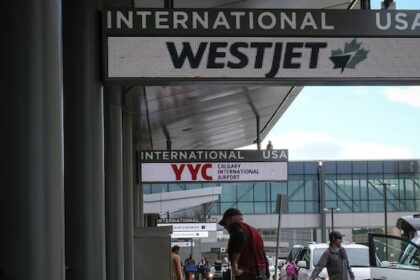New BrunswickA New Brunswick shellfish processing plant wants the federal court to intervene after it was ordered to pay an historic $1 million fine and banned from using Canada’s Temporary Foreign Worker Program for 10 years over how it treated its foreign workers.Bolero Shellfish Processing wants federal court to quash decisionBolero Shellfish Processing Inc. contends Employment and Social Development Canada ‘unreasonably delayed’ its investigation and decision, prejudicing the company’s ability to respond to the allegations. (René Landry/Radio-Canada)A New Brunswick shellfish processing plant wants the federal court to intervene after it was ordered to pay an historic $1 million fine and banned from using Canada’s Temporary Foreign Worker Program for 10 years because of how it treated its foreign workers.Bolero Shellfish Processing Inc., based in Saint-Simon, on the Acadian Peninsula, has filed an application for leave to commence a judicial review. In the document, the company argues, among other things, that the penalties imposed by Employment and Social Development Canada have caused it to “suffer considerable stigma akin to a finding of guilt in a criminal proceeding without any right to a trial or a hearing.””These measures go well beyond a mere regulatory response and have the effect of significantly damaging the company’s reputation and operations, and are grossly disproportionate to the … allegations.”In addition, the federal inspection process took more than four years, which Bolero argues prejudiced its ability to respond to the allegations. Officials “reversed the onus of proof,” presuming the company was in violation of immigration and refugee protection regulations and that any alleged non-compliance was “intentional and in bad faith,” the document says.According to a government registry of employers that have been found non-compliant with conditions of the foreign worker program, Bolero was found to have:Broken federal or provincial laws for hiring and recruiting employees.Not met the pay or working conditions in the job offer.Not done enough to prevent abuse or reprisals in the workplace.If the application for leave is granted, Bolero wants the Sept. 17 decision quashed or set aside and the matter remitted to the federal department for reconsideration, with any directions the court deems appropriate.Bolero is also seeking a declaration that the decision is invalid or unlawful and a public retraction of any statements by federal officials, including a news release issued Oct. 6.Bolero declined further comment through Gabriel Elbaz, a spokesperson for parent company Sogelco International Inc. In an email to CBC News, she cited the matter being before the courts.Details of findings revealedThe application for leave, however, provides new details about how the investigation unfolded and the company’s response.In April 2021, Bolero received a notice of inspection from an agent at Service Canada regarding an approval the company received the year before to employ 17 temporary foreign workers at the fish plant.Three months later, the company received a second notice, which extended the scope of the inspection to include a 2018 approval to employ 18 fish plant workers.In July 2023, an officer for Service Canada informed Bolero that the processing of its new request to hire temporary foreign workers was suspended. The department said it suspected the company was not complying with certain working conditions, and this could put the health or safety of the foreign national at risk.On Dec. 27, 2023, the officer asked the company to respond to the alleged non-compliance by Jan. 8, 2024.Bolero requested an extension, saying the person responsible for preparing a response was on vacation and would be out of the country until Jan. 14. But on Jan. 8, the day the company’s response was due, the officer denied the extension.On Jan. 15, Bolero filed what it called a “partial” response.’Explanations and justifications’ A year later, on Jan. 28, 2025, the officer issued a notice of a preliminary finding that Bolero “may have committed violations” of the immigration and refugee protection regulations.Among the preliminary findings: temporary foreign workers did not work the minimum 30 hours per week as required, and some workers ended their contracts with an outstanding debt to Bolero after receiving salary advances for hours that they had not in fact worked.In its May response, Bolero provided the following “explanations and justifications.””Eight TFWs (temporary foreign workers) did not work an average of 30 hours per week because of dramatic and unforeseeable changes in economic conditions that directly affected the business of the employer.”Several TFWs arrived only in September or October 2020, delayed by COVID-19 travel restrictions, at a time when business activity was substantially reduced.”Nevertheless, because all the TFWs had signed an employment contract that guaranteed an average of 30 hours of work per week during the duration of their contract, Bolero paid the workers for the equivalent of 30 hours of work per week even though they did not work those hours.”Bolero argues that it “did not financially abuse the TFWs. On the contrary, the objective of the procedure implemented by Bolero was to provide advance payments to the TFWs, with their consent, to mitigate the impact of reduced work availability.”At the end of the contract, Bolero says, it did not require repayment of any advance payments. The company alleges it confirmed in writing to the affected workers that those amounts “are not considered a debt, but rather losses that were absorbed by the company.” Some of the other preliminary federal findings included that deductions were withheld from the wages of two of Bolero’s workers despite their having previously refused those deductions, the appropriate overtime rate was not paid to one worker, two workers were not covered by private health insurance until they became eligible for the provincial health plan, and 10 were not paid the minimum attendance salary required by provincial standards when they worked for less than three hours.Bolero contends these were all the result of administrative errors and have been corrected.
Fish plant seeks judicial review of $1M fine, 10-year ban from foreign worker program











